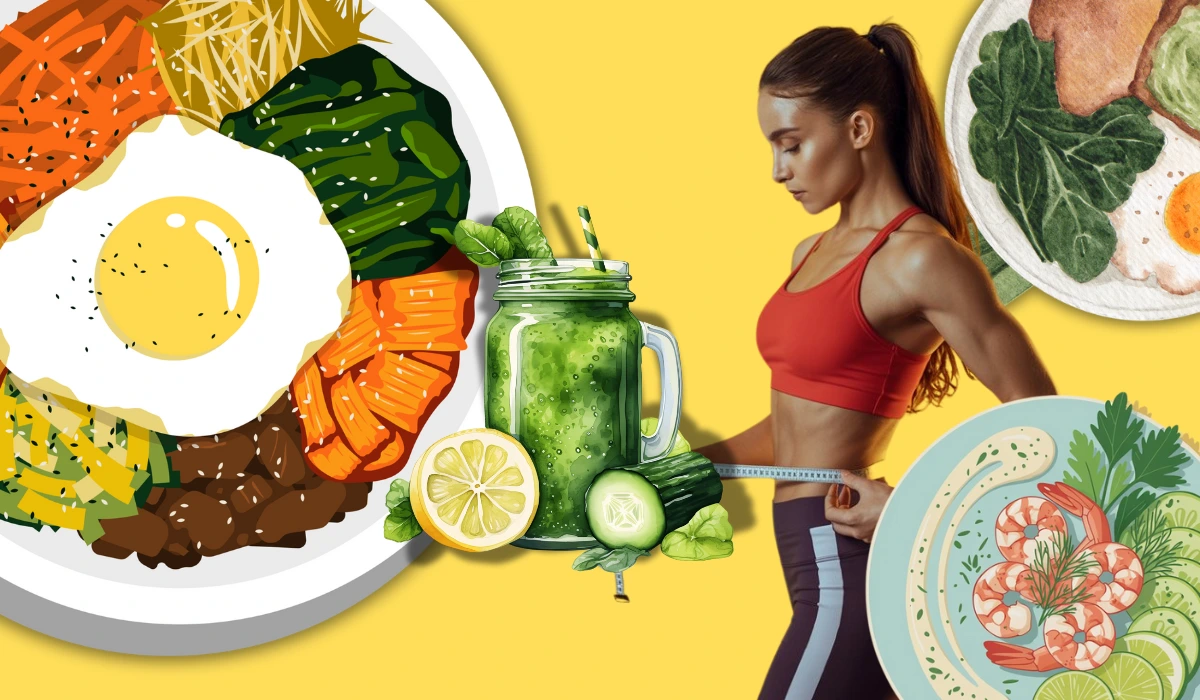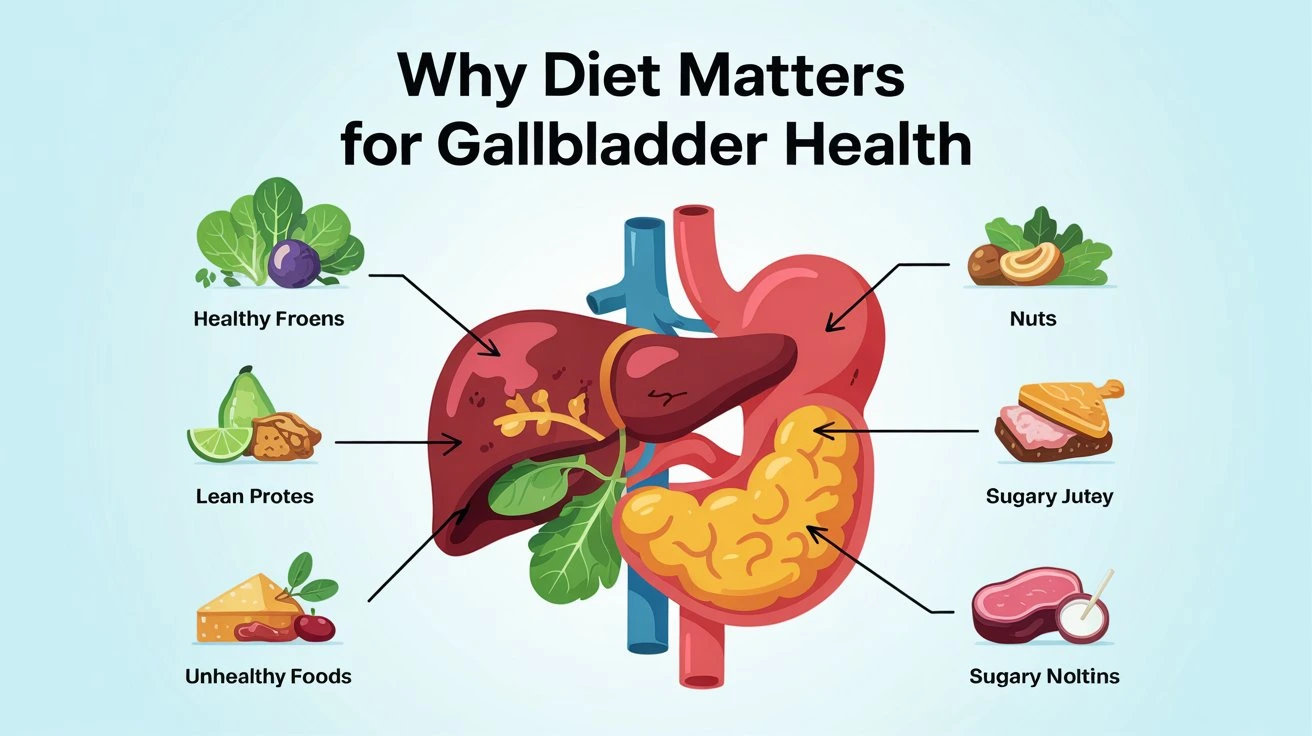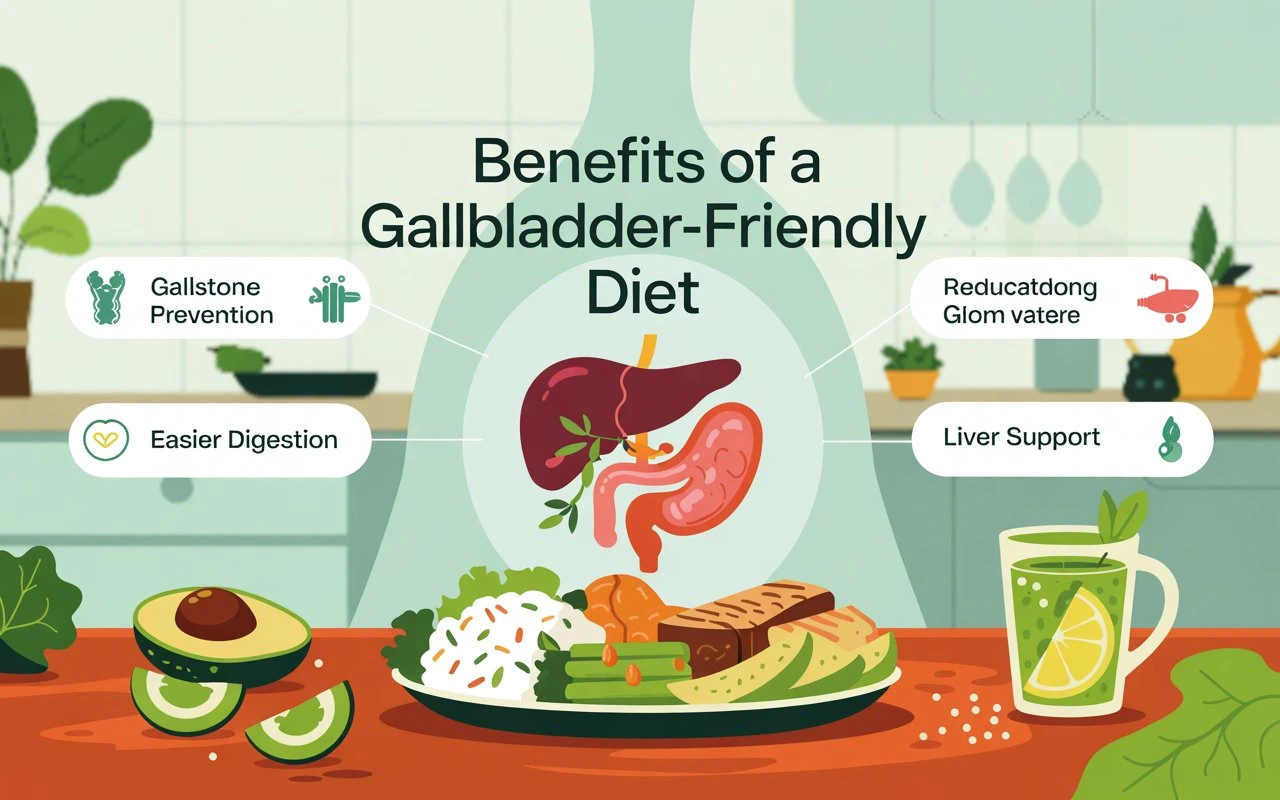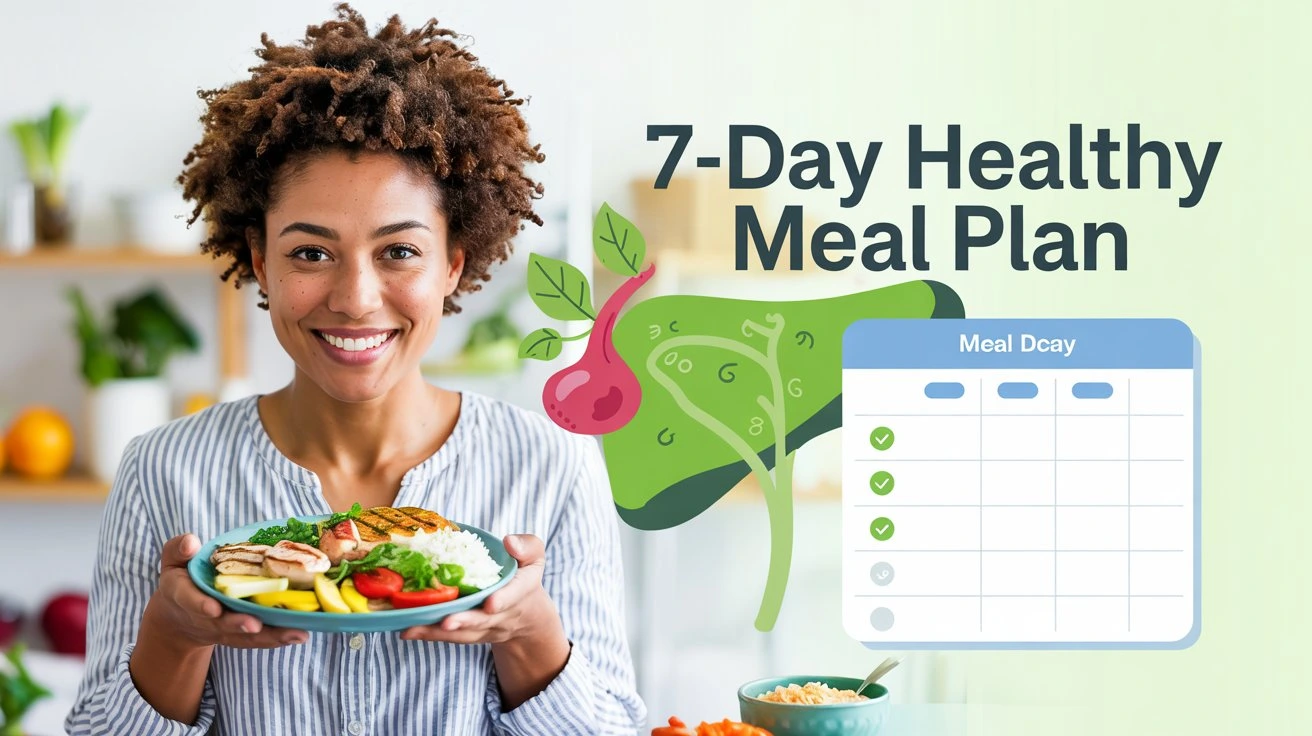The gallbladder is a small but essential organ that plays a key role in digestion by storing and releasing bile, which helps break down fats. Despite its size, the gallbladder can cause significant discomfort when it’s not functioning properly. Issues like gallstones, inflammation (cholecystitis), or even gallbladder removal (cholecystectomy) can make maintaining a healthy diet crucial for managing symptoms and improving digestion.
If you’re looking for a practical, easy-to-follow plan to support your gallbladder health, this 7-day meal plan is tailored just for you. Whether you’re recovering from gallbladder surgery or trying to prevent complications, this guide will help you make informed food choices while enjoying delicious meals.
The Mediterranean Diet: Your Path to Lasting Health

Looking for a sustainable way to lose weight without feeling deprived? The Mediterranean Diet offers a delicious solution backed by impressive research. Inspired by the eating patterns of Italy (ranked #1 in global health) and other Mediterranean countries, this approach transforms how you eat and feel.
The Simple Formula for Success
Unlike restrictive diets, the Mediterranean approach emphasizes:
- Abundant fruits and vegetables
- Whole grains and legumes
- Healthy fats from olive oil and nuts
- Moderate fish and lean proteins
- Limited processed foods and sugars
This balanced approach naturally regulates appetite while providing essential nutrients your body craves.
Proven Benefits Beyond Weight Loss
Research from Food Research International confirms what success stories already show – people lose 10-50 pounds while enjoying flavorful meals. Beyond weight management, followers experience:
- Increased energy levels
- Improved skin condition
- Better digestive health
- Reduced inflammation
- Lower disease risk
Cherish from Ohio lost 13 pounds while enjoying delicious meals, proving you don’t need to sacrifice taste for results. The Mediterranean Diet isn’t just another weight loss plan – it’s a sustainable lifestyle that transforms your relationship with food for lasting health.
Also Read:
Gallbladder 7 Day Meal Plan
7-Day Ayurvedic Meal Plan
30-Day Low Fodmap Meal Plan Pdf
7 Day Meal Plan for Football Players
500 Calories a Day Meal Plan Pdf
Prolon Transition Day Meal Plan
40 Day Turn Up Meal Plan PDF
What Does the Gallbladder Do?
The gallbladder acts as a storage organ for bile, a digestive fluid produced by the liver. When you eat fatty foods, the gallbladder releases bile into the small intestine to help break down fats. However, when the gallbladder becomes overworked or obstructed (e.g., due to gallstones), it can lead to pain, indigestion, and other symptoms.
Common Gallbladder Problems
- Gallstones: Hardened deposits of cholesterol or bile salts.
- Cholecystitis: Inflammation of the gallbladder.
- Biliary Dyskinesia: Poor functioning of the gallbladder muscles.
- Post-Cholecystectomy Syndrome: Digestive issues after gallbladder removal.
Why Diet Matters for Gallbladder Health

A well-planned diet can:
- Reduce stress on the gallbladder.
- Prevent the formation of gallstones.
- Improve digestion and nutrient absorption.
- Alleviate symptoms like bloating, nausea, and abdominal pain.
By focusing on low-fat, high-fiber foods and avoiding trigger foods, you can support your digestive system and overall health.
Dietary Guidelines for Gallbladder Health
Key Principles
- Low-Fat Eating: Limit fat intake to reduce bile production stress.
- High Fiber Foods: Include whole grains, fruits, vegetables, and legumes to aid digestion.
- Healthy Fats in Moderation: Choose unsaturated fats like olive oil and omega-3-rich foods.
- Small, Frequent Meals: Avoid overloading your digestive system by eating smaller portions throughout the day.
- Stay Hydrated: Drink plenty of water and herbal teas to support digestion.
Foods to Eat
Incorporate these foods into your daily meals:
- Lean Proteins: Skinless chicken, turkey breast, white fish (e.g., cod), tofu.
- Whole Grains: Brown rice, quinoa, oats.
- Fruits: Apples, berries, citrus fruits (oranges, lemons).
- Vegetables: Broccoli, spinach, carrots.
- Healthy Fats: Olive oil, avocados (in moderation), flaxseeds.
Foods to Avoid
Avoid these foods as they can trigger symptoms or worsen gallbladder issues:
- High-Fat Foods: Fried foods, fatty cuts of meat (e.g., pork belly).
- Dairy Products: Full-fat milk, cream-based sauces.
- Sugary Snacks: Cakes, cookies, candies.
- Refined Carbohydrates: White bread, processed cereals.
Benefits of a Gallbladder-Friendly Diet

Following a gallbladder-friendly diet offers several benefits:
- Reduces the risk of developing gallstones.
- Eases digestion by minimizing bile production demands.
- Relieves symptoms such as bloating and abdominal discomfort.
- Supports overall liver health by reducing fat intake.
The Gallbladder 7-Day Meal Plan
Here’s a detailed 7-day meal plan designed to be both nutritious and easy on your digestive system. Each day includes breakfast, lunch, dinner, and snacks.
Day 1
| Meal | Description |
|---|---|
| Breakfast | Oatmeal topped with fresh strawberries and a drizzle of maple syrup. |
| Lunch | Grilled chicken salad with wild rice and mixed greens. |
| Dinner | Baked cod served with quinoa and steamed broccoli. |
| Snack | Air-popped popcorn seasoned with herbs (no butter). |
Day 2
| Meal | Description |
|---|---|
| Breakfast | Banana-spinach smoothie made with almond milk and flaxseeds. |
| Lunch | Quinoa salad with diced tomatoes, cucumbers, and olive oil dressing. |
| Dinner | Ground turkey stir-fry served over brown rice with sautéed bell peppers. |
| Snack | Whole-grain crackers with low-fat cheese or hummus. |
Day 3
| Meal | Description |
|---|---|
| Breakfast | Greek yogurt topped with chopped apples and a sprinkle of cinnamon. |
| Lunch | Lentil soup paired with a side of steamed asparagus. |
| Dinner | Baked salmon served with roasted sweet potatoes and green beans. |
| Snack | Rice cakes topped with natural almond butter or jam (sugar-free). |
Day 4
| Meal | Description |
|---|---|
| Breakfast | Scrambled egg whites with whole-grain toast and avocado slices (optional). |
| Lunch | Low-fat vegetable soup with a slice of whole-grain bread. |
| Dinner | Stir-fried tofu with broccoli and carrots in a light soy sauce glaze. |
| Snack | Fresh pear slices with fat-free cottage cheese or plain yogurt. |
Day 5
| Meal | Description |
|---|---|
| Breakfast | Apple cinnamon oatmeal cooked in almond milk with chia seeds. |
| Lunch | Turkey wrap in a soft whole-grain tortilla with lettuce and mustard spread. |
| Dinner | Baked tilapia seasoned with lemon juice served alongside steamed zucchini. |
| Snack | Fresh fruit salad (melon cubes, grapes, kiwi). |
Day 6
| Meal | Description |
|---|---|
| Breakfast | Smoothie made with mangoes, spinach, almond milk, and collagen powder. |
| Lunch | Grilled shrimp salad tossed in olive oil dressing with mixed greens. |
| Dinner | Roasted turkey breast served with baked potato wedges and steamed carrots. |
| Snack | Veggie sticks (carrots/celery) dipped in salsa or hummus. |
Day 7
| Meal | Description |
|---|---|
| Breakfast | Egg white omelet filled with spinach and bell peppers; side of toast. |
| Lunch | Wild rice salad topped with shredded chicken breast and fresh herbs. |
| Dinner | Baked tilapia served alongside roasted Brussels sprouts and quinoa pilaf. |
| Snack | Baked apple slices sprinkled with oats and cinnamon (no added sugar). |
Recipes for Key Meals
Here are some simple recipes for popular dishes in the meal plan:
Banana Spinach Smoothie
Ingredients:
- 1 banana
- 1 cup spinach leaves
- 1 cup almond milk
- 1 tbsp flaxseeds
Blend all ingredients until smooth.
Baked Tilapia with Lemon-Dill Sauce
Ingredients:
- Tilapia fillets
- Lemon juice
- Fresh dill
Season tilapia with lemon juice and dill; bake at 375°F (190°C) for 20 minutes.
Apple Cinnamon Oatmeal
Ingredients:
- Rolled oats
- Almond milk
- Chopped apple
Cook oats in almond milk; top with apples and cinnamon before serving.
Tips for Success
- Meal Prep Ahead: Cook grains like quinoa or brown rice in bulk for quick meals.
- Use Substitutions: For gluten-free options, swap whole grains for alternatives like millet or buckwheat.
- Stay Hydrated: Drink herbal teas like peppermint or chamomile to soothe digestion.
7 FAQs About Gallbladder Health and Meal Plans
1. What foods should I avoid if I have gallbladder problems?
You should avoid high-fat foods like fried items, fatty meats, full-fat dairy products, sugary snacks, and refined carbohydrates. These can trigger gallbladder symptoms such as pain and indigestion.
2. Can I eat eggs if I have gallbladder issues?
Egg whites are a better option than whole eggs because the yolk is high in fat, which may stress the gallbladder. Scrambled egg whites or omelets with vegetables are ideal choices.
3. Is a vegetarian diet better for gallbladder health?
A vegetarian diet can be beneficial as it typically includes low-fat, high-fiber foods. However, you should ensure proper protein intake through plant-based sources like lentils, beans, tofu, and quinoa.
4. Are smoothies safe for a gallbladder-friendly diet?
Yes, smoothies made with low-fat ingredients like almond milk, fruits (e.g., bananas and berries), and greens (e.g., spinach) are safe and can be a nutritious addition to your meal plan.
5. Can I drink coffee or tea with gallbladder problems?
Moderate amounts of coffee or tea are generally safe unless they irritate your digestive system. Herbal teas like peppermint or chamomile are better options for soothing digestion.
6. How can I manage gallbladder symptoms after eating fatty meals?
To manage symptoms, avoid fatty meals altogether. If discomfort occurs, drink plenty of water, eat smaller portions in future meals, and include high-fiber foods to aid digestion.
7. Is it necessary to follow a gallbladder-friendly diet after gallbladder removal?
Yes, even after gallbladder removal, a low-fat diet is recommended to prevent digestive discomfort since bile flow directly into the intestines can overwhelm digestion without the gallbladder’s storage function.
8. Can this meal plan prevent gallstones?
While diet alone cannot prevent gallstones entirely, eating a balanced diet low in fat can significantly reduce your risk.
9. What should I do if I experience pain while following this diet?
If pain persists or worsens after meals, consult your doctor immediately.
10. Can I follow this plan post-gallbladder surgery?
Yes! This plan is gentle on digestion and works well for those who have had their gallbladders removed.
Conclusion
A gallbladder-friendly diet doesn’t have to be boring or restrictive! By following this carefully designed 7-day meal plan, you can enjoy flavorful meals while supporting your digestive health and reducing discomfort associated with gallbladder issues.
Remember to consult your healthcare provider before making significant dietary changes—especially if you have an underlying condition or have recently undergone surgery.
Start your journey toward better gallbladder health today!
